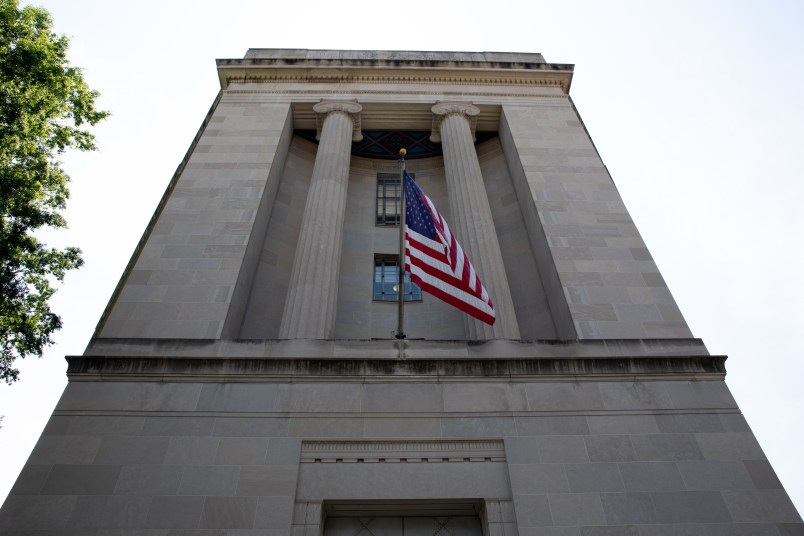For more than a week before it received a formal referral from the intelligence community inspector general, the Justice Department was aware of the concerns being raised about President Trump’s July 25 Ukraine call, reporting by the New York Times and elsewhere has revealed.
The heads up the Justice Department was given — which came to the department via the CIA — put it in a position to quickly conclude that Trump’s conduct on the call was not illegal and to decide that a formal whistleblower complaint need not be transmitted to Congress.
The chain of events was discussed at length on Monday’s installment of the New York Times podcast The Daily.
It goes to show how the normal processes for reporting government impropriety are ill-equipped to handle misconduct accusations brought against the president of the United States.
As was previously reported, before the whistleblower — a CIA officer who had worked in the White House — filed a complaint with intelligence community inspector general Michael Atkinson, the concerns were brought to CIA General Counsel Courtney Elwood.
According to The Daily episode, the whistleblower had tasked a colleague with flagging the issue to the office of the CIA’s top lawyer so he could keep his identity anonymous.
What the colleague told Elwood’s office was very vague, New York Times reporter Julian Barnes said on the podcast. The colleague flagged that there were concerns about the President’s call with a foreign leader but didn’t identify the call’s date or the country it concerned.
Following standard practice, Elwood then reached out to the White House.
Around the week of Aug. 5, there were a series of calls between the CIA and the White House, as the White House lawyers tried to figure out the seriousness of the concerns, according to Barnes.
At some point, the whistleblower became aware that the White House was investigating the call — and that White House lawyers, rather than CIA attorneys, were interviewing White House officials about Trump’s remarks to Ukrainian President Zelensky.
This is believed to have spooked the CIA officer, given it wasn’t the independent investigation he was hoping for, and pushed him make the more formal complaint with Inspector General Atkinson. By now, according to the New York Times, he had heard more from his White House sources about how the White House attorneys were handling the fallout from the call, including that they had put records on the call in the restricted access call system.
The IC inspector general received the formal complaint on Aug. 12.
As the inspector general was beginning his own evaluation of the whistleblower’s allegations, the review of the call being done by the CIA and the White House was well underway.
On Aug. 14, the CIA general counsel alerted the Justice Department about what she was looking into, CNN reported, and DOJ lawyers went to the White House to look at the rough transcript themselves.
That was when the Department of Justice first became aware of the call, according to the AP, and what it concerned — including a mention of Attorney General Bill Barr himself. The information was passed up the DOJ chain, including to Barr.
It was more than a week later, towards the end of August, that the intelligence community inspector general made his criminal referral to the Justice Department, according to CNN.
On Aug. 26, Atkinson submitted his report to acting Director of National Intelligence Joseph Maguire on the whistleblower complaint, finding it to be credible and assessing it to meet the “urgent concern” requirement that triggers a transmittal to Congress.
Under that process, Maguire would have a week to review the complaint himself before sending it along to the House Intelligence committee with his own thoughts.
Instead, however, Maguire reached out to the White House, because he believed it raised executive privilege concerns since the complaint centered on a presidential conversation with a foreign leader.
Maguire also reached out to the Justice Department for its advice. By then, the Justice Department had been looking at the call for several days.
On Sept. 3, the Justice Department’s Office of Legal Counsel issued an opinion determining that the complaint did not meet that “urgent concern” definition and that that the allegations could stay within the Justice Department’s purview, rather than be turned over to Congress.
The Justice Department decided that what Trump was seeking on the call — an investigation into the family of political rival — did not constitute a thing of value under campaign finance law and thus an investigation into a campaign finance violation was not warranted.
Atkinson notified the House Intelligence Committee on Sept. 9 that a complaint existed even as he was being blocked by the administration from providing it. Had he not done so, it’s possible that no one outside of the executive branch would have ever known about the details of the call and the whistleblower’s other allegations.






